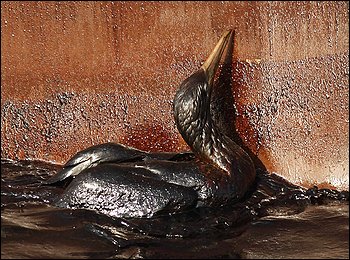http://thehill.com/blogs/ballot-box/senate-races/100361-bp-oil-leak-spills-into-florida-senate-race
By Sean J. Miller – 05/27/10 06:55 PM ET
The deep-water oil leak in the Gulf of Mexico may emerge as a controversial pocketbook issue in the Florida Senate race.
Floridians are watching nervously as the oil slick in the Gulf drifts toward the state’s pristine beaches and rich fishing waters. The spill has made “Floridians more aware than ever how dependent we are on coastal industries,” said Susan MacManus, a professor at the University of South Florida.
Florida Gov. Charlie Crist wants to call state lawmakers into a special session in order to pass a constitutional amendment permanently banning drilling off Florida’s coast – a position supported by two of his Senate rivals but not Republican candidate Marco Rubio.
“He’s holding discussions with our legislative leadership to propose a constitutional ban on offshore drilling,” said Sterling Ivey, a spokesman for the governor’s office. “He would like to have the voters of Florida decide whether they want drilling off the coasts of Florida.”
Rubio said government’s focus should be on stopping the leak in the Gulf, not on passing a ban.
“Calling for an emergency special session to constitutionally ban something that is already prohibited by state law is nothing more than an election-year stunt,” he said in a statement.
Meanwhile, Rep. Kendrick Meek (D-Fla.) signed on to a letter from Florida’s congressional Democrats pushing Crist to call a special session.
“For Florida, it may yet mean full or partial destruction of the world’s third largest coral reef in the Florida Keys and a devastating hit to Florida’s beaches and tourism-driven economy,” the lawmakers wrote. “Governor, you have the authority to call the Legislature back to Tallahassee. We urge you to do so.”
A spokesman for real estate mogul Jeff Greene, who’s challenging Meek for the Democratic Senate nod, said he “100 percent supports calling a special session to ban” offshore drilling.
Florida already has a ban on offshore drilling in place, but observers say anything less than a state constitutional amendment could one day be overturned by state lawmakers.
The proposed amendment can move through the Legislature with a majority. It would then be placed on the state’s November ballot, where it would require a 60 percent vote to pass.
Ivey said the Republican leadership in the state Senate has expressed willingness to return to Tallahassee for a special session but those on the House side are reluctant. The GOP controls both chambers.
Ivey said Crist is working to convince the state House leadership to support the constitutional ban and return for a special session to pass it.
“The leadership in the Florida House is not interested in coming back to Tallahassee to support the issue,” Ivey said. The governor could summon them back, but Ivey said he’s reluctant to do that without the guarantee they’d work to pass the ban. “If they’re not going to pass the amendment, it may not be best to bring them back not to do any work,” Ivey said.
It could also be a political liability for Crist, who already has alienated Republicans by dropping out of the GOP Senate primary and launching an Independent bid.
Sources told The Hill that state House lawmakers’ patience with Crist is running short. They were already frustrated by Crist’s veto of an education bill last month and would be enraged by a summons to the capitol. Part of their frustration is that under Florida statute, lawmakers seeking state-level office can’t raise campaign money while the Legislature is in session. But that provision doesn’t apply to candidates for federal office, so Crist could still raise money while the lawmakers worked through what’s expected to be a special session that could last between four days and two weeks.
If the ban amendment does end up on the ballot, it could become a central issue of the campaign, forcing the candidates to stake out firm positions on the question. Moreover, if the oil reaches Florida’s beaches, “it would be one more huge pocketbook issue,” said MacManus.
Already, she added, “people are canceling hotel reservations, fishermen are freaking out.”
State tourism officials told The Associated Press that Panhandle-area businesses – those closest to the spill – have suffered a roughly 30 percent drop and that hotels in the Florida Keys have started to see a decrease in new bookings.
But there are also some risks with pushing for a permanent ban – the public’s mood could be different by November.
“Suppose gas prices by then are really, really high,” MacManus said. That would make a drilling ban unpopular. “There’s that uncertainty,” she noted.
Special thanks to Richard Charter
